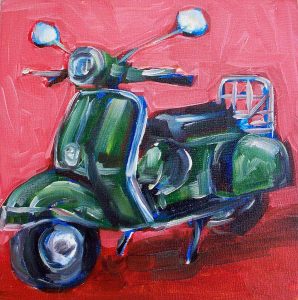How To Unhook From Panic and Anxiety
 A friend of mine has been dealing with anxiety and panic attacks lately. He says he has “riding anxiety” because it happens most often when he is driving his car or when he is on his scooter. He called me the other day and said, “Mary, the strangest thing happened to me. I went to a scooter rally over the weekend and did not have any anxiety at all. How can that be? Scooter rallies can be dangerous because there are so many riders close to each other and you can easily crash into other people. Riding in a rally requires heightened attention, careful balancing and handling, and greater physical ability. There are so many risks and you just have to stay focused to stay upright. I was expecting my anxiety to be really bad at the rally. But it was the complete opposite. When I was in the pack of riders, I was not scared at all. As a matter of fact, I was loving the thrill of it and had a ball. It doesn’t make sense to me.”
A friend of mine has been dealing with anxiety and panic attacks lately. He says he has “riding anxiety” because it happens most often when he is driving his car or when he is on his scooter. He called me the other day and said, “Mary, the strangest thing happened to me. I went to a scooter rally over the weekend and did not have any anxiety at all. How can that be? Scooter rallies can be dangerous because there are so many riders close to each other and you can easily crash into other people. Riding in a rally requires heightened attention, careful balancing and handling, and greater physical ability. There are so many risks and you just have to stay focused to stay upright. I was expecting my anxiety to be really bad at the rally. But it was the complete opposite. When I was in the pack of riders, I was not scared at all. As a matter of fact, I was loving the thrill of it and had a ball. It doesn’t make sense to me.”
I told my friend it makes perfect sense to me. I explained that people like dangerous sports or activities because they require paying attention to what is happening in the moment. In other words, they are using their attention to be present for what is rather than having it follow their thoughts wherever they go. I also explained to my friend that his anxiety is not actually about riding the scooter; rather, the anxiety that has been there for years now is attaching itself to riding the scooter.
The question is: How can we have this level of attention that my friend experienced during the scooter rally in our daily lives? It is important to understand that the mind we live in is, most of the time, run by fear. Many of our fears are small ones, like not making it to work on time or being upset about a spot on our shirt. These little fears add to a subtle feeling of unease that we don’t even notice because it has been so long since we have known deep ease. But sometimes our fear expands and begins to ‘awfulize’ about most anything.
Anxiety and panic attacks are a heightened state of fear and when fear amplifies to this level, it can be terrifying. What do we do when fear arises? We turn away because that is what we have been conditioned to do, beginning when we were very young. The mind doesn’t want to look at the fear because it is afraid of it so it resists and distracts itself with food, alcohol, busyness, TV, texting, etc. But not looking at our fears doesn’t make them go away. We just stuff them below the level of our everyday awareness where they build and can surface at any time, causing all sorts of havoc.
It is an amazing gift when you can learn how to meet your fear, especially when you are having anxiety or a full-blown panic attack. Your fear is just like a dear friend who is hurting. It wants to be acknowledged, listened to and touched with your heart. When you are able to relate to the fear-based stories rather than from them, you can make direct contact with your fear. Imagine you are riding down the road in your car or on your scooter and all of a sudden you feel fear and panic begin to rise inside of you. There is no immediate danger but your mind sees it as danger. By turning toward your fear and acknowledging it, you are no longer identifying with the fear, thinking it is you.
It is a wonderful revelation on the path of awakening when you realize that you are not the stories in your head; you are awareness that can see and be with them instead. The more you can acknowledge your fear and bring it into your heart, the more it loses its power over you. At first turning toward your experience can be scary and confusing. We have run away from our fears for so long that they feel like monsters rather than young parts of ourselves asking to be seen and heard. The safest thing you will ever do is to turn toward your fear and, rather than falling into it, actually be present for it. For your accepting attention can transform even the deepest of fears back into the joy of being fully alive.
Image of Green Vespa by Sheila Tajima http://fineartamerica.com/profiles/sheila-tajima.html



